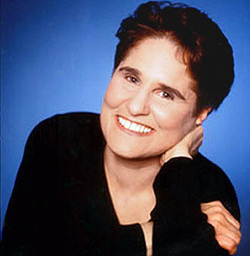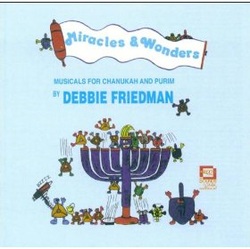
Debbie Friedman was born in February of 1951 in Utica, New York, though she was raised, from the age of 5, in Minnesota. Her music of choice, the music that would serve as her inspiration, was the folk music of Joan Baez, Peter, Paul and Mary, and Bob Dylan.
In the 1960s, Friedman attended and worked at a summer camp in Wisconsin where, one summer, she picked up the guitar and taught herself to play. It was also at about this time that Friedman realized something. As she related to the Los Angeles Times in 1995, "One night I went to synagogue and realized, sitting there, I was bored." One of the things about folk music that so appealed to her was the participation. Sing in a group of camp-goers and everyone joins in. Even those who don't sing clap their hands or stomp their feet. Perhaps they all join hands and sing together. Here, in synagogue, "nobody was doing anything". Debbie wanted to do something about this and, she said to the New York Times in 1998, "it came so easily, as if the music was already there, waiting to come out"
The first original melody came to Debbie shortly after her "bored" realization. She put it to the words of "V'ahavta", a prayer taken from Deuteronomy. Playing the new song for her high school friends and camp attendees, Friedman found that her peers had longed for more relatable worship music as well. Friedman's first album of such songs, "Sing Unto God", was released in 1972. 1974 saw her first release of Hanukkah songs, "Not By Might, Not By Power"--the title track from which is one of Friedman's best known Hanukkah compositions. "Not By Might, Not By Power" was issued on CD (along with Friedman's other early records) as "In The Beginning" (a 3-CD set which Amazon MP3 has chosen to split up into, more or less, it's component parts).

Much of Friedman's original music has been directed towards children, including a few of her best known Hanukkah songs, "Dreidel Song" and "Latke Song". Both of those appeared on an album of songs Friedman wrote for a musical about Jewish holidays, "Miracles And Wonders". Other albums containing Hanukkah songs from Friedman include "Songs On Wheels", "Shanah Tovah", and "Light These Lights". Friedman also wrote and recorded music for other Jewish holidays such as Purim, Rosh Hoshanah and Yom Kippur. Debbie's most recent release was 2010's "As You Go On Your Way", an album of songs taken from the daily prayer book. Most of Friedman's in-print discography can be purchased through her web site.
Although Friedman's original Hanukkah music may not be as familiar to collectors as Adam Sandler or Barenaked Ladies, it is in large part her influence that, in essence, gave artists "permission" to re-imagine the traditional liturgy into more contemporary styles. I certainly can't recall a contemporary arrangement of a traditional Hanukkah song, like "S'Vivon" or "Al Hanisim", prior to 1974. Can you?
Debbie Friedman, just 59 when she died, was loved worldwide and the total breadth of her influence has yet to be realized. Those wishing to make donations in her memory may find the address for the Renewal Of Spirit Foundation at Debbie's web site.
 RSS Feed
RSS Feed

